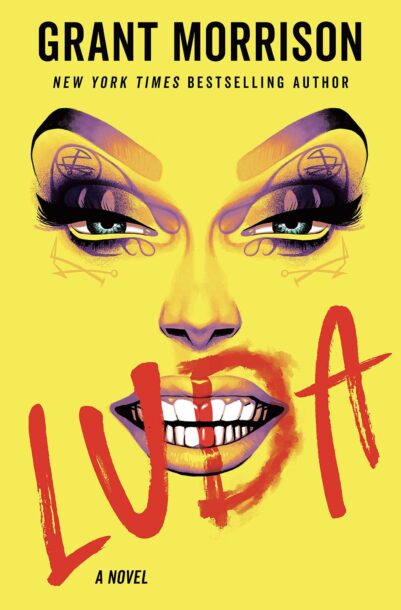 By GRANT MORRISON (Del Rey; 2022)
By GRANT MORRISON (Del Rey; 2022)
The first novel by comics legend Grant Morrison, one of the most brilliant and unpredictable writers on the scene. LUDA is everything I was hoping for, a challenging and phantasmagoric piece of work that follows no set perimeters of any sort. You won’t find any superheroes or shock effects here (as opposed to its author’s previous fare, which includes ARKHAM ASYLUM and KID ETERNITY), but you will find a wholly distinct and fully rounded fictional universe with a classically informed narrative based on the legend of Merlin, and his undoing at the hands of his protégée Lady Vivian.
The narrator is Luci LaBang, a veteran Glasgow based drag queen. A former TV star and current performer in a pantomime review, Luci’s latest production is THE PHANTOM OF THE PANTOMIME, described as “the plot of THE PHANTOM OF THE OPERA drugged, kidnapped and rehoused in the ghetto of Irony.” That sentence captures the book’s highly referential (self and otherwise) nature, a Morrison trademark that as filtered through Luci’s jaunty and flamboyant sensibility is allowed to run riot.
Frequently referenced is something called the Glamour, which isn’t explained until over a hundred pages in. We also learn of Luci’s infatuation with a young Trans performer known as (among numerous other names) Luda, which likewise takes some time to be fully detailed. Luci is a narcissist—thus explaining, in part, the obsession with Luda, whose face is “My own exaggerated to perfection”—and also a world class naval gazer, making absolutely sure we get a full accounting of the very particular universe in which this tale occurs. Luci may be a bit too widely informed based on the character background we’re given, with an insanely thorough grasp of literary minutiae that would appear to reflect not the background of the character but, rather, the author (surely one of the best-read people in the comic book—and now literary—field).
The Glamour, we learn, is a mystical state that enhances one’s creative faculties, and into which Luci frequently enters (with drugs, unsurprisingly, being central to the process). Luda is quite interested in the Glamour and its properties, and Luci is eager to act as an initiate, even though Luda’s motives and background seem increasingly suspicious. It gradually becomes clear that Luda (like Lady Vivian) has ulterior, and very likely dangerous, motives.
The detailing of the Glamour is, in keeping with most literary drug-hallucination descriptions, not always compelling–something that’s acknowledged by the narrator (“Descriptions of drug trips are boring too. Any misguided attempt to describe what’s going on in your mind is boring”). One wonders how these passages might have worked had they been rendered in the form of comic book art (rendered, preferably, by previous Morrison collaborators like Dave McKean or Jon J. Muth), but here we have to rely on Morrison’s descriptive power and consistently pithy, quasi-parodic tone.
Those attributes work quite well otherwise, particularly in the gritty yet darkly enchanting descriptions of Morrison’s hometown Glasgow: “Brutalist, sublime, the fragmentary ramps and cryptic sections of deserted roadway always made me think of fossilized mega-dinosaurs with rusting iron sinews, plated with cracked tarmac and radiating indefinable significance.” We also get extremely thorough accountings of THE PHANTOM OF THE PANTOMIME, which essentially provides a distorted mirror reflection of the narrative’s happenings, not unlike the increasingly destructive relationship between Luci and Luda.
